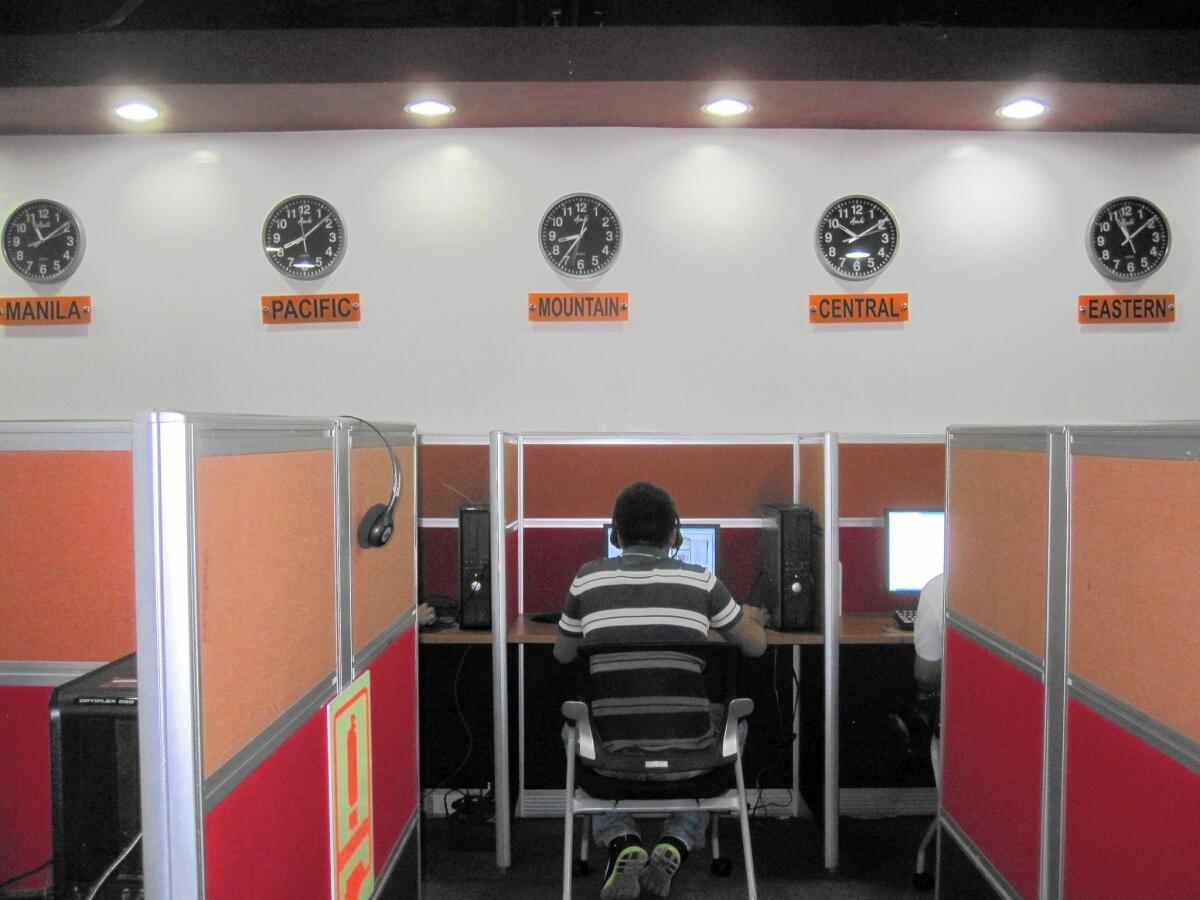The Philippines has become the call-center capital of the world

- Share via
Reporting from Manila — Ever since Joahnna Horca lost her father, a doctor, in a South China Sea typhoon, her large family has struggled to make ends meet.
So after Horca earned a college degree in social work, an older sister nudged her to help support the family by taking a better-paying job — at a call center.
That was eight years ago, when the outsourcing industry was just taking off in the Philippines. Today, it’s the job of choice for many young people here. More than 1 million Filipinos now work at call centers and in related outsourcing businesses, mostly serving American companies.
The combination of cheap labor and specialized skills has made the Filipino workforce invaluable to a growing list of U.S. companies, which use them to field customer complaints, generate sales leads, code data, format documents and read medical scans and legal briefs.
Horca, 30, eventually got her social-worker license, but she could never tear herself away from the call-center job for a U.S. banking company. It’s draining work. She handles as many as 100 calls a day from angry Americans, often working the graveyard shift.
But she makes about $700 a month, more than many general physicians earn in the Philippines, let alone social workers.
The industry in the Philippines has grown so fast that it has overtaken India as the call-center capital of the world. India still rules the information technology outsourcing realm, but an army of Filipino college graduates like Horca now dominates most every other kind of task known as business process outsourcing, or BPO.
By next year, experts estimate that the country’s BPO industry will generate $25 billion in revenue, accounting for about 10% of the Philippines’ economy and as much as the total amount expected to be sent home by the 11 million Filipino nurses, sailors, musicians and others working overseas.
The English spoken by Filipinos is closer to Americans’ than in India. “Our culture is very similar,” said Fred Chua, a lifelong Manila resident who runs a call center. A cousin in San Francisco drums up business for the company, Magellan Solutions. “We don’t yell on the phone often. We’re very customer-centric,” Chua said.
That helps explain why the country has become America’s top overseas site for voice-related work in business outsourcing.
Corporations such as Citibank, Safeway, Chevron and Aetna all have BPO operations here, as do smaller companies ranging from a Georgia medical collection agency to a New York spa operator that outsources its customer appointments.
The outsourcing boom has helped propel the country’s economy, once a laggard of Asia, into one of the region’s fastest-growing. The industry has spawned bustling business districts in Manila, with skyscrapers, 24-hour buffets and condos that sell for $500,000.
For most of the last four decades, while East Asian tiger economies were roaring ahead, the Philippines wallowed amid rampant corruption, lousy roads and sluggish investments.
But after 25 years of slow and painful reforms, the country is on track to achieve annual growth rates of 7% to 10% over the next 10 years, according to Bernardo Vilegas, a Harvard-trained Filipino economist. The economy expanded 7.2% in 2013 and slowed to a little more than 6% last year, compared with China’s 7.4% last year.
One of the Philippines’ biggest advantages is its large and growing young population: About 90% of its 100 million people are under 55, compared with 61% for Japan and 73% for the U.S. Most Filipinos also speak English, which is one of two official languages along with Tagalog.
For years foreign remittances by Filipinos working abroad were a pillar of the country’s economy, along with agriculture and mining. Now the resurging economy is drawing some of those workers back home.
Butch Valenzuela, 55, left Manila in the early 1980s to escape rioting as masses protested the strong-arm rule of Ferdinand Marcos. Valenzuela went to California, attended UCLA, rose through the ranks at a manufacturing company and built a comfortable life in Orange County.
But a few months ago, Valenzuela’s wife sold their house in Irvine and moved back to Manila, joining her husband who had returned to the Philippines several years earlier to set up a call center.
Valenzuela launched Visaya Knowledge Process with 14 workers. He has yet to make a profit, but it has grown to about 200 “seats,” which is the way the industry measures the size of an operation.
Visaya is one of about 1,000 BPO operations in the Philippines. A few giants led by Convergys and Accenture, which have tens of thousands seats each, dominate the business. But the pie keeps getting bigger as American companies seek cheaper labor. Call-center workers in the U.S. make about four times their Manila counterparts.
On a recent weeknight, it was hard to tell night from day at Visaya’s call center on the 14th floor of a nondescript building in Makati, an affluent district in Manila. The curtains were drawn, and the clocks on the office wall were displaying different times in four U.S. zones.
At midnight local time, the call center came to life as dozens of workers, sitting cubicle by cubicle, began making calls to generate customer leads for a group of California’s for-profit schools.
Other workers dialed American hospitals to verify claims for insurers. All in all, it was an easy shift for the staff compared to when they are assigned to deal with unhappy Home Shopping Network customers.
No matter how difficult the caller, Valenzuela said, “our agents can’t hang up. They have to figure out a way of calmly ending a call.”
Industry turnover is high, on average about 60%, said Jose Mari P. Mercado, president of the IT & Business Process Assn. That means a typical worker who starts in January will be gone by July, a sign of how stressful and demanding the jobs can be.
Yet the relatively good pay — call-center workers make double the average salary of a Manila bank teller — keeps drawing people into the market. Mercado reckons that business outsourcing to the Philippines will grow for years to come.
American and European companies are increasingly outsourcing more sophisticated work that was once largely done by legal secretaries, junior accountants and medical staff in the U.S. This includes preparing research reports, formatting documents and providing clinical support.
“We produce 3,000 CPAs a year,” said Mercado, noting that they’re trained according to U.S. accounting standards.
Likewise, law schools in the Philippines follow American curriculum, making graduates an attractive low-cost option for some U.S. businesses. Starting associates at Manila law firms generally make roughly $700 a month — about as much as Joahnna Horca makes at a call center.
“It’s not only about cost, but about efficiency across all lines of business,” said Bob Gogel, chief executive of Integreon Inc. in New York, which has BPO operations in a dozen cities around the world, including Manila and Fargo, N.D.
He insisted that the overseas boom wasn’t eliminating jobs in the U.S. While his Manila office is growing, he said, so is the one in North Dakota, which has 175 employees but is being expanded to 300.
Integreon’s Manila office opened in 2007 and already has 700 employees. Benjamin Romualdez, the company’s country head, said demand is particularly strong for legal transcription, document formatting and brief preparation. Integreon now has 200 Filipino lawyers on staff and under contract.
One of them, Julius Cerada, spends most of his work nights poring over briefs and highlighting parts that might be of interest to U.S. clients. Cerada wouldn’t say what he earns, only that it’s competitive with what he made as an in-house company lawyer. It wasn’t about the money, he said of why he quit in 2013 and joined Integreon.
“Work-life balance is important to me,” he said, noting that he was putting in too many hours before. “I just turned 50. Health is my primary concern.”
More to Read
Inside the business of entertainment
The Wide Shot brings you news, analysis and insights on everything from streaming wars to production — and what it all means for the future.
You may occasionally receive promotional content from the Los Angeles Times.











